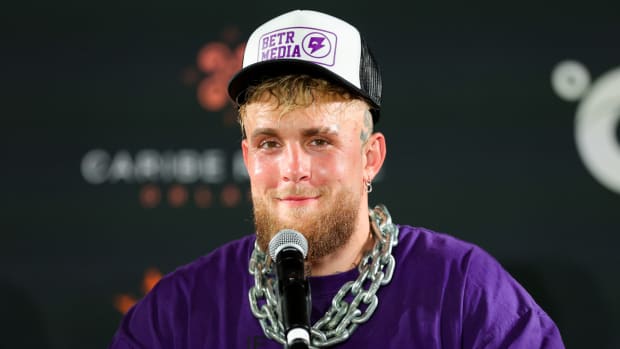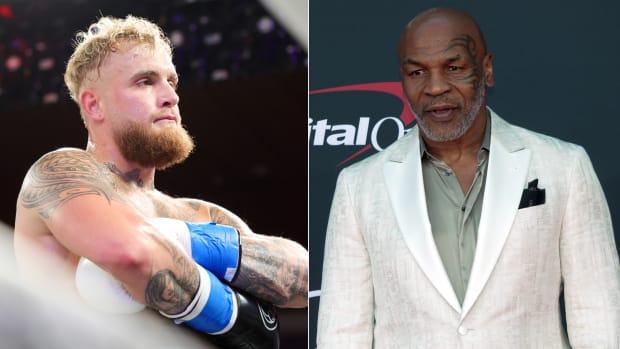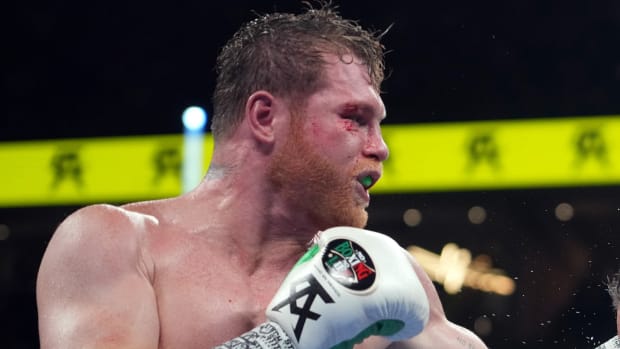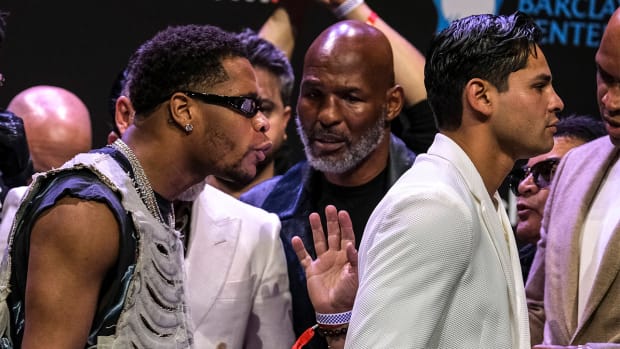Russian immigrant Egis Klimas makes successful transition from boxes to boxing
Egis Klimas came to the United States from Russia almost 30 years ago. First, he became a pizza box maker, then a crab fisherman, then an international businessman, then, at this moment, the best manager in boxing. Anyone opposed to anti-immigration policy need point no further than to his resume, the most inimitable in sports. But Klimas isn’t into politics.
He’s aware that Donald Trump is president and that Trump wants to build a wall and change immigration policy to make it tougher for people to come here from other countries. People, you know, like Klimas. He’s also aware that his story says more than any protest march. That his successes—winning Manager of the Year from the Boxing Writers Association of America in 2016, the stable that features consensus top-five pound-for-pound boxers in Vasyl Lomachenko and Sergey Kovalev—speak to America and possibility and dreams.
“I don’t like politics,” Klimas says. “I’m not a politician. I’m just like any other human being.”
That’s true but not exactly. As Klimas helps Lomachenko prepare for his upcoming junior lightweight title fight—against Jason Sosa on Saturday outside Washington, D.C., near Trump’s new home—he can’t help but look back at a life that never seemed real, not even to him.
Klimas grew up in Lithuania and spent two years in the Russian Army, building the garages where his superiors stored rockets. When his service ended, a relief organization, the International Rescue Committee, presented him an option he had seize immediately: to move to the United States. They offered food stamps and temporary housing. Klimas asked one of the workers which American city the worker most liked. Seattle, the man said.
After stops in Austria and Italy, Klimas arrived in the Emerald City in 1989. He had $42 in his pocket. As his ride from the airport climbed over the hill on Interstate 5 and into the hubbub of downtown Seattle, his mind raced. “The whole city is right there, like on your palm,” he says. “I saw all these big, huge buildings and felt like I’m nobody here on this earth. Kind of like, goddamn, what am I going to do?”
His concern lasted for all of three days, until Klimas landed his first gig, at the most American of companies—Pizza Hut. He walked in, stammered out “work” and “job,” and the manager taught him to fashion those familiar cardboard pizza boxes and hired him on the spot.
Klimas fished in his spare time, stalking trout and salmon in local lakes and rivers. He once needed 45 minutes, and a friend’s assistance, to reel in an eight-foot sturgeon on the Columbia River. The size of the fish, he swears, has remained steady over time.
All the catching and releasing led to his next job, when a Lithuanian woman he knew offered Klimas work in Alaska, on her husband’s crab boat, for three times what he made at Pizza Hut. He slaved for 20 hours a day, for three months at a time, shoving fish guts into crab traps. He banked $15,000 and moved back to Seattle, where he drove delivery trucks during the day and delivered pizzas—always, pizzas!—at night.
Mayweather vs. McGregor is a bad idea, but we are still going to watch
In the 1990s, Klimas started to send friends American goods like tennis shoes. Then televisions. Then refrigerators. He began to dispatch items to companies, like timber, often in bulk. His formed a business, and built a team that took apart a sawmill in Oregon, sailed the parts to an island in Russia and reassembled them. That led to another business, Global Food Importers, which distributed shrimp and other food to the United States from Thailand.
None of this has anything to do with boxing, other than it enabled Klimas to turn his favorite hobby into a permanent career. He boxed some in his youth and followed the sport obsessively upon his arrival in America. In particular, he loved the heavyweights from the 1990s, everyone from Mike Tyson to Evander Holyfield to Riddick Bowe. “Never, ever in my mind did I think I would work in boxing,” Klimas says.
He did save enough to fly to Las Vegas in 1992 to watch Holyfield-Bowe I. He stayed at The Mirage and ran into Leon Spinks and the weekend felt like a dream, an American dream, in this country that created a street filled with casinos in the desert. He had only arrived three years earlier, and already, he was at a heavyweight fight.
Roughly 10 years later, he met Don Turner, a boxing trainer best known for his work with Holyfield. Turner said something that surprised Klimas—find me some Russian boxers. So Klimas did, securing two locals from a gym outside Seattle and moving them to train with Turner in North Carolina.
Neither of those fighters panned out, but by that point Klimas had connections. A friend called in 2003 raving about a devastating puncher—Kovalev. He hadn’t received much support from the Russian federation, but he hit, and he hit hard. With the right training, his friend said, the boxer could be made into a champion. Klimas called Kovalev, then met with him in Kazakhstan, signing him to the deal that changed both their lives.
With Klimas funding his training, housing and food, Kovalev became a light heavyweight champion, a boxer so feared he earned the nickname Krusher. He knocked down unbeaten Andre Ward in their bout last November but lost by a close unanimous decision, his only defeat in 32 pro bouts. At the same time Klimas built Kovalev into an attraction, he also landed Lomachenko, one of the greatest amateur boxers ever, a two-time Olympic gold medalist (2008, ’12) from the Ukraine.
Klimas flew Lomachenko to the United States, where they met with various promoters before stopping by the Las Vegas office of Bob Arum, chairman and founder of Top Rank Boxing. Arum was in Los Angeles but flew Lomachenko there in first class and signed him immediately. The boxer didn’t even ask for a signing bonus. All he wanted was a title bout. In 50 years of promoting fighters that had never before happened to Arum. Lomachenko won that world title in his third fight, in part, he says, “because I decide to work with Egis.”
Kovalev and Lomachenko gifted Klimas with all the boxing leverage he ever wanted to expand his stable and stage good fights. Kovalev’s first bout with Ward was so close it demanded a rematch and one has finally been scheduled for June 17 in Las Vegas.
Lomachenko is so good that Arum, who has worked with fighters ranging from Muhammad Ali to Oscar De La Hoya, Floyd Mayweather Jr. and Manny Pacquiao, describes Lomachenko in terms grand even by boxing’s hyperbolic standards. “He’s the best fighter I’ve seen since Ali,” Arum says. “He is a master, a genius. He does things that nobody else does—his command of balance, his geometric aptitude, tremendous timing.”
That boxers from warring countries picked the same U.S. immigrant for a manager speaks to what has always been possible in America and remains possible in 2017. They listen to Klimas, Arum says, because he comes from where they come from and has lived the lives they’ve lived. He, too, had to struggle. He, too, has reached the greatest heights of his profession far from home. They know Klimas went from assisted housing to a California mansion, decorated with boxing memorabilia. They want that, too.
“Egis is the perfect example of why America is great and there's no such thing as great again," Arum says, unable to resist a jab at his new favorite foil, Trump.
Klimas says that if Trump removes immigrants with criminal records he’s all for it. But he doesn’t expand much on policy beyond that. He’d rather talk boxing, or tell the story of a party he went to a few years ago, when the hosts ordered, well, Pizza Hut.
“I’ll tell you what,” he says, laughing. “I liked it.”
The only problem, Klimas says, is the franchise changed its boxes. Then he stops as if considering all the events that connect from 1989 to 2017, from making pizza boxes to eating pizza out of them. Never did he imagine this, right up until it happened. “Everything is different now,” he says, the immigrant turned American success story on the eve of another fight.






